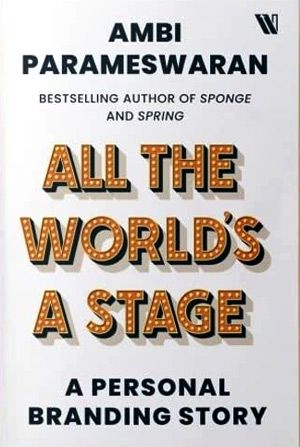'Who you know today will determine who you know tomorrow.'
'Becoming an expert in your domain will incentivise others to have you in their networks.'
'And the more diverse your network, the better it is.'
An enlightening excerpt from Ambi Parmeswaran's All The World's A Stage: A Personal Branding Story.

'Networking never harmed anybody. And to be a good networker you don't need to learn how to swim or fly.
'Research has shown that if you are a master at what you do and exude that enthusiasm, then you will be able to network better.
'If you have a good executive presence and good executive voice, you have won half the battle. You will always remember your tailor who spoke so passionately about how he only uses double-fused collars that will never develop a bubble. Or a doctor who took the trouble to explain your skin problem in great detail.
'It has been found that often people who we may call mavens build good networks. People want to speak with them. And in the process, they give them interesting leads and ideas,'I added.
'Who you know today will determine who you know tomorrow. Becoming an expert in your domain will incentivise others to have you in their networks. And the more diverse your network, the better it is.
'The late Professor Bala Balachandran, who set up Great Lakes Institute in Chennai, once said that his network is his net worth,' I added.
'Professor Bala was a true visionary and his heart was in India. Now this might be a really basic question, but what is this network of contacts you are referring to?' Shankar wanted to know.
'Well, who are your network of friends and advisors? In fact, who introduced them to you? And who did you introduce them to?' Rita explained the complexities of unravelling a network of relationships.
'Your network needs to be wide and diverse. Unfortunately, most of our networks are based on old college friends and colleagues. There is a theory that says that most of our networks are based on the self-similarity or proximity principle,' I added.
'Sorry, what? What is the self-similarity and proximity principle?' Kunal wanted to know.
'Kunal, if you were to list the top 10 people in your network who you can turn to for help at any time, who would they be?
'It has been found that most people are comfortable with friends who are from a similar background as them. In your case, they may be our batchmates. Or even people from other IIMs. Or people in your industry. Or people who worked with you in the same office.
'These are good networks but have their limitations,' I explained.
'Arre, how can you make friends outside your circle? You will know people only like yourself, no?' Shankar asked.
I think he was still not convinced about the power of networks, but the fact that he was asking the question was an indicator that he may be thawing to the concept.

'You will notice that often a very interesting suggestion may come from the least expected place. That person may be a friend from your club, or a neighbour, or an acquaintance at your yoga class. Or she may be in the cultural centre where you are a regular,' Rita said.
'Now that you say it, I remember someone in my gym referring an interesting business opportunity to me,' Shankar commented. 'But I dismissed it as an accident. I did not realise that even this has been studied.'
'There is proven research on the need to have a diverse network of contacts. I will not bore you with that. But do you know how Bill Gates got an entry into IBM?' I asked.
'I know that Microsoft, which was still a start-up then, had been given the contract to create the software to run the early IBM PC machines. I thought Bill Gates must have chased them for the opportunity and got lucky,' said Kunal.
'There is an interesting story behind it.
'Bill Gates' mother, Mary Gates sat on the board of United Way, a charity organisation. There she got to know John Akers, a senior-level executive in IBM, who was also on that board. Both were giving their time pro-bono and had developed a healthy respect for each other.
'One day Akers asked Mary Gates about her son. She replied that her son had dropped out of college and was working on something called a 'software'. Akers was interested in meeting young Bill Gates. And that was the beginning of Microsoft DOS that ran IBM PC.
'It is quite possible that Bill Gates may have met someone else in IBM and pitched his product. But this story really happened.
'Interestingly, it worked for both of them.
'IBM PC was launched in 1981 in record time after the project was green-lighted by the board. IBM unleashed a fabulous ad campaign featuring the Little Tramp, a Charlie Chaplin character. To end the story, John Akers went on to become the CEO of IBM in 1985!' I added.
'Wow, lucky accident it was, wasn't it?' Shankar piped up.
'Maybe it was just serendipity. But perhaps not. People who study networks say that in addition to your usual network, you should try and develop a new passion or a new shared activity. That is a great way to expand your social circle and to meet interesting people who may be mutually useful,’ I completed the story.
'Now you know why I play golf every weekend, Rita. That is my shared activity and passion. I meet so many interesting people on the golf course. And I try playing with new people often. It is a bit of a challenge, but hopefully the rewards are commensurate,' said Kunal.
'When using networks, you need to be careful on how to build a series of exchanges.
'At the most basic level is asking for a favour. At the next level is getting into an exchange process -- I do this for you and you do this for me.
'But it is better to build meaningful and lasting connections; so be a giver and not a taker. Ask about a problem that needs solving,' Rita was giving her husband some tips to use on the golf course.
Kunal looked at her with benevolence and pride, 'You're absolutely right. I should ask what I can do to help, instead of always thinking what I want from a person in my network.
'Givers have a stronger relationship and reputation than takers. They fare better than matchers or takers, I am sure. I suppose they earn more goodwill and capital.'

'Kunal, there is a concept called reciprocity ring.
'A group of people meet casually with the condition that each will ask a favour of another. And the other person has to do the favour.
'In my own case, I don't ask for favours, but I ask for advice.
'I remember a friend who was moving out of his active job. He decided to meet one person in his network every two days and managed to meet 50 people of great influence over two months.
'He did not ask any of them for any help. He just told them where he was and asked for their advice. And, as you know, everyone is happy to dispense advice,' I added.
'Seeking advice is a great way to recruit an advocate, Kunal. It makes the seeker look humble, respectful and open-minded and the giver looks magnanimous in her own eyes,' Rita joined the discussion.
*'Which is better? Seeking new contacts or reaching out to old ones?' Shankar wanted to know.
'Well, Shankar, it is never too late to build new contacts, but often we neglect the power of reviving dormant ties,' said Rita, the golf widow, smiling at Kunal.
'I think it is important to note that networking is not just grabbing visiting cards mechanically and is in fact much more complicated and interesting. I hope we have managed to convince you, Shankar.'
'Well, a few minutes ago I thought that networking was just about buttering up people and collecting visiting cards. I did not know that there is so much more to it.
'Tell me, how does this play in the context of personal branding that we have been speaking about? How can a young executive build a diverse network?' Shankar asked.
'Networking is part of your personal branding journey. You need to make the right connections and maintain them in a way that feels authentic.
'Nourish the network by an active give-and-take process. Share and spread new ideas.
'Tap mentors for support and expertise; this is especially important for youngsters. Learn to pitch in the elevator, on the escalator and during a car ride. Manage your image online and remember to reach out after losing touch,' Rita answered.
'Well, Shankar, as we saw, personal branding starts with you. What is it that sets you apart from your peers? How do you define yourself? And what are you interested in becoming?
'In that context, you build your personal brand by widening your network.
'For instance, if I am a bright marketing person in your company, I may want to volunteer at an NGO and help them manage their marketing better.
'Finance might be my day job, but my passion for music might keep me active in the music circle in my city.
'But all this has to be done sincerely. It cannot be a post-it job. You cannot do something that you do not care about. And if you do a shared activity with passion, you are bound to make some new friends and also get your personal brand to shine brighter,' I concluded.
Excerpted from All The World's A Stage: A Personal Branding Story by Ambi Parameswaran, with the kind permission of the publishers, Westland Business











